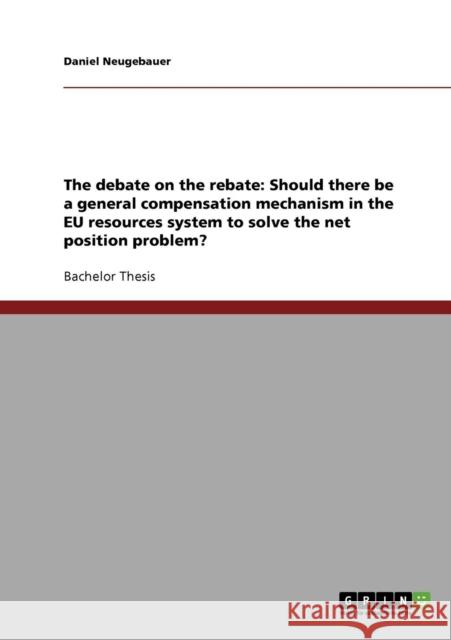The debate on the rebate: Should there be a general compensation mechanism in the EU resources system to solve the net position problem? » książka
The debate on the rebate: Should there be a general compensation mechanism in the EU resources system to solve the net position problem?
ISBN-13: 9783638662055 / Angielski / Miękka / 2007 / 48 str.
The debate on the rebate: Should there be a general compensation mechanism in the EU resources system to solve the net position problem?
ISBN-13: 9783638662055 / Angielski / Miękka / 2007 / 48 str.
(netto: 173,98 VAT: 5%)
Najniższa cena z 30 dni: 183,70
ok. 16-18 dni roboczych
Bez gwarancji dostawy przed świętami
Darmowa dostawa!
Bachelor Thesis from the year 2006 in the subject Politics - International Politics - Topic: European Union, grade: 1, University of Twente (Bedrijf Bestuur en Technologie), 24 entries in the bibliography, language: English, abstract: In the conclusion of the European Council in December 2005, the Presidency mentions only in a single sentence what had filled covers of newspapers the days before: "The European Council reached agreement on the Financial Perspective 2007-2013 as set out in doc. 15915/05."1 It was the second attempt after a former Council six month before, and also this time it needed tough negotiations and a number of revised proposals, until the quoted sentence could be printed. The reason for this controversy can be summarized in an old German adage: "Beim Geld hort die Freundschaft auf." Those who are partners in other situations begin to bargain over every Euro they have to spend for the EU budget, giving short-term national interests priority to long-term EU interests. In some way this is understandable, despite the fact that the Council should bring forward the European project - politicians are elected in the nation states and have to justify every Euro they leave in Brussels. Besides this, the term of "solidarity" has neither in Article I-2 of the "Treaty establishing a Constitution for Europe"2, nor in article 1 of the "Treaty on European Union"3 been concretised. But nevertheless the difficulties surrounding the agreement on the Financial Perspective are symptoms of a serious problem: Countries which pay more into the budget than they get back, the so-called net contributors, feel to have unacceptable high costs in relation to the benefits they gain from their EU-Membership. The debate on "net positions" is one of the major reasons which lead to the low acceptance of the European Union in public: According to Eurobarometer, 62% of the population are worried "about the increasing costs for the Member States of building Europe."4 Only the fea











